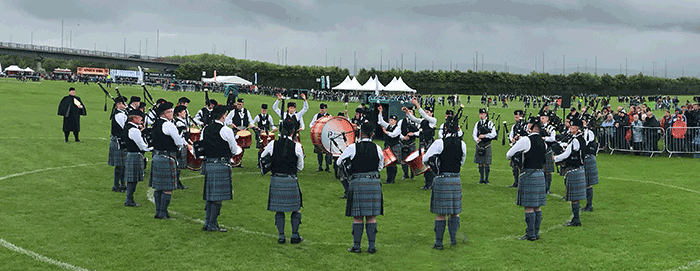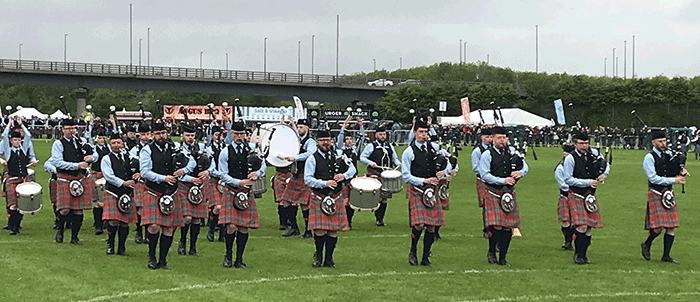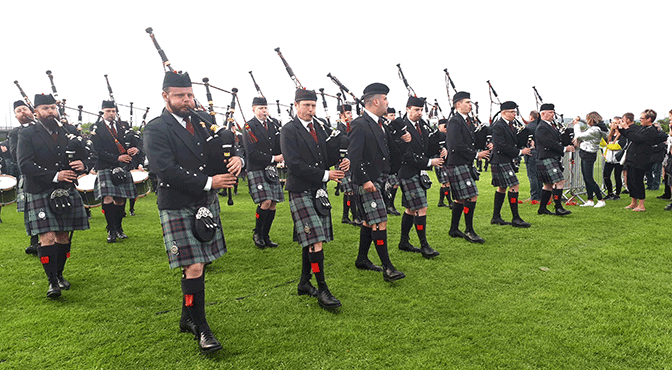
I think it’s time again that you raise the old chestnut of the same tunes being played time after time in the MSR, especially in Grade 1, writes reader Ian Forbes. I almost lost count of the number of G1 bands playing Lord Alexander Kennedy [at the British Championships]. I applaud Scottish Power who played the lovely march 93rd Highlanders, and who got two firsts in piping. Marvellous.
Here are my views on the Grade 1 MSR tunes at Paisley: Four bands played Lord Alexander Kennedy, one band played Balmoral Highlanders and two bands Highland Wedding as the march.
These are all great marches, but we have heard them so many times. This generates audience fatigue and boredom. I applaud Scottish Power for playing 93rd Farewell to Edinburgh and Shotts playing Stirlingshire Militia.
What has happened to all the other great ‘band’ marches that we never hear: Young MacGregor, Captain Carswell, Dugald MacColl’s Farewell tae France, Colin Thompson, Cowal Highland Gathering, Jimmy Young, Brig. Gen. Cheape, to name but a few.
[wds id=”2″]
The same situation is true with reels; same old tunes being played: Charlie’s Welcome, Mrs MacPherson, Sheepwife, John Morrison of Assynt House.
If the RSPBA and the Grade 1 bands themselves want to attract bigger audiences for MSR competitions (especially at the Worlds, when the stadium is usually empty), then they should show more imagination and more variety when selecting their MSR. Without the audience, these competitions have little value.

The Editor responds: It is hard to disagree with any of what you write Ian. What I will say is that for me the March, Strathspey and Reel remains the true test of the technical and musical ability of a band.
Medleys provide the opportunity for clever ‘orchestrations’ however, and as exercises in co-ordination between the various sections of a band can stretch the creative juices and abilities. So they make different demands.
But to the aficionado the ‘competition’ MSR will provide just as much, if not more, entertainment and interest. Scottish Power’s march at Paisley will be one of the highlights of the 2019 season for me, and that is only after one major.

Hearing SLOT, an Irish band, giving life and lift to the Islay Ball was a pleasure too. Guys, you’re not supposed to be able to play strathspeys, no more than Scots can tackle jigs!
If anyone is in any doubt about the MSR being the true test, then check out the differentces lower down the grade. All Grade 1 bands can turn in an enjoyable medley but they can’t all sustain a solid, technically cohesive MSR.

The fingers go, the unison suffers, the blowing’s affected as the difficulties mount. That is why less capable players will look forward to the medley but worry about the MSR.
I have heard calls that the MSR is some sort of an anachronism; a relic from the past that it is time to drop. Well, there is only one relic from the past that should be dropped and that is the competition circle – but don’t get me started on that.
The MSR remains the arbiter par excellence of a pipe band’s true strength musically, technically and as a unit. But I agree with Mr Forbes. It is time for some variety.
Bands get scorned for repeating the same medley year on year – why not so with the MSR? This is one of the attraction of medley contests – listeners know they are invariably going to hear something new, something different. A band that wins a major with a particular set should be made to change it for the following season.
And for me, I’d switch them round at the Worlds; Medley to start, MSR the climax. That would shake things up and do away with the safety first, ‘clean run’ aproach to the MSR.
But to the central point: Without more variety the MSR will continue to receive a bad press and lose appeal for an audience. However these worrying trends are no reason to impugn the integrity and question the status of the most testing discipline we have for our pipe bands.
[wds id=”8″]



















